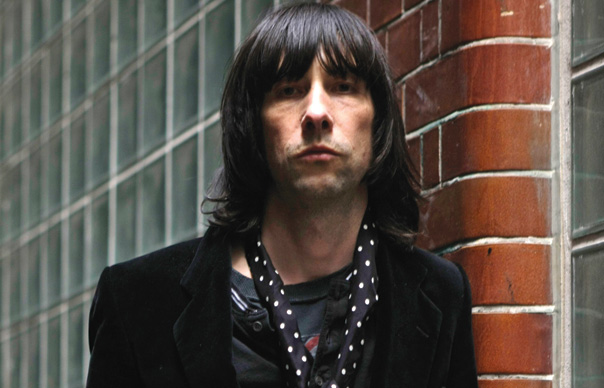The trick, surely, is to find the right balance between work and play. Gillespie and the Scream currently have a formidable attitude to work. As Gillespie explains, “We do 12 to 5 or 6, five days a week”, in the Primrose Hill studio they’ve owned since 1996, with the line-up now settled on bassist Mani, guitarists Andrew Innes and Barrie Coddigan, keyboard player Martin Duffy and drummer Darrin Mooney. The Scream’s work ethic, as Trainspotting author Irvine Welsh observes, is like “being on an oil rig. You work hard when you’re on the rig, then you get two weeks off. Coming from that background where you know you’re not going to get something for nothing, you have to graft to get anything back.”
The drive to achieve and put in the hours is conspicuously strong in Gillespie. While the gangly frame and occasionally comedic moments onstage may not necessarily have marked him out as a star in the band’s earliest days, it’s a role he has, over time, perfected admirably, fuelled by a desire to immerse himself completely in the mythology of rock’n’roll.
He speaks at great length about bands he admires, from the Sex Pistols to early Siouxsie And The Banshees and Nick Cave, with whom he sees a certain affinity: “I look at Nick and he’s as excited by this new record as he probably was from when he started the Birthday Party. That’s inspiring and beautiful. If you can maintain that sense of wonder… If you’re still excited by what you do, you’re inspired to keep making new music.”
This feeling, perhaps, is key to Gillespie. When he says “We love this new record, we just work. We want to keep doing it!” with such force, I half-expect him to suddenly jump up and start pumping the air, like a cheerleader in alligator lace-ups.
So where does this passion come from? And does he see it reflected in a younger generation of bands?
“When we were growing up, it was punk rock. And you had the threat of war. The British were at war with the IRA, all across Europe the same thing was happening, and in the Middle East. I grew up at a time when people were questioning the spectacle, fighting against it and trying to rip it apart. And now maybe people don’t question that, they’ve accepted it or are dazzled by the whole celebrity culture. I don’t really know what bands are informed by, because they’re 20 and I’m in my 40s. Just in the same way that if you’d grown up in the ’30s or ’40s, you might have been more literate than if you grew up in the ’70s because there was no TV, and you got information from books. It’s differences like that, I guess.”
It’s all the fault of Big Brother, then?
“In the ’60s, Marshall McLuhan said that in the future, all wars would be fought in the media. And it’s true, because people are completely blinded by garbage. You hear people talking about ‘Did you see Big Brother last night?’ I think the curse of the modern age is a complete lack of culture. I don’t watch TV, I hardly ever buy newspapers. But I’ve got to live in the world, so you’re in a room and someone’s watching TV or you walk into a newsagent and it’s there in front of you.”
You never read the celebrity mags?
“No, but our album Evil Heat did get one of the best reviews in Heat magazine. A lot of people never gave it a good review, so I have a special place in my heart for Heat…”



